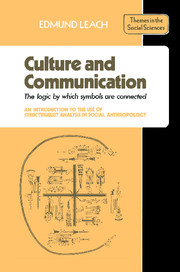 Culture and Communication
Culture and Communication The concluding paragraphs of Sections 3 and 4 may lead the cynical reader to conclude that I have only set up the elaborate discriminations proposed in Section 2 and Fig. 1 (p. 12) in order to demonstrate that they are inapplicable to practical situations. To some extent this is true! Jakobson, who first emphasised the importance of the polarity metaphor/metonymy made it clear from the start that in actual observable forms of discourse, either verbal or non-verbal, the two modes are always mixed up, though one may predominate over the other. The prototype of a general message-bearing system is not a line of type but the performance of an orchestra where harmony and melody work in combination.
Jakobson's insight has been developed by Lévi-Strauss to provide his celebrated technique of myth interpretation. The key point here is not just that metaphor and metonymy, paradigmatic association and syntagmatic chain, are combined, but that the ‘meaning’ depends upon transformations from one mode into the other and back again.
To see just what Lévi-Strauss is getting at you need to follow through some of his examples in detail. But the formal principles of the method are fairly straight forward. Lévi-Strauss first breaks up the syntagmatic chain of the total myth story into a sequence of episodes. He then assumes that each episode is a partial metaphoric transformation of every other. This implies that the story as a whole can be thought of as a palimpsest of superimposed (but incomplete) metaphoric transformations.
To save this book to your Kindle, first ensure no-reply@cambridge.org is added to your Approved Personal Document E-mail List under your Personal Document Settings on the Manage Your Content and Devices page of your Amazon account. Then enter the ‘name’ part of your Kindle email address below. Find out more about saving to your Kindle.
Note you can select to save to either the @free.kindle.com or @kindle.com variations. ‘@free.kindle.com’ emails are free but can only be saved to your device when it is connected to wi-fi. ‘@kindle.com’ emails can be delivered even when you are not connected to wi-fi, but note that service fees apply.
Find out more about the Kindle Personal Document Service.
To save content items to your account, please confirm that you agree to abide by our usage policies. If this is the first time you use this feature, you will be asked to authorise Cambridge Core to connect with your account. Find out more about saving content to Dropbox.
To save content items to your account, please confirm that you agree to abide by our usage policies. If this is the first time you use this feature, you will be asked to authorise Cambridge Core to connect with your account. Find out more about saving content to Google Drive.